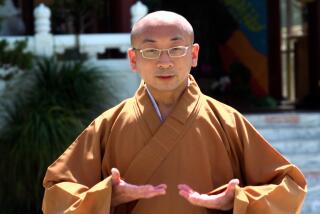EXCERPT : The Saint of Hedonism
- Share via
There was once in the south of India a hedonistic king who valued his pleasures and his treasures above all things. However, this king also enjoyed intelligent conversation, and from time to time visitors were invited into the royal chamber, where he reclined on his lion throne, dressed in the most sumptuous of garments.
One day, a wise yogin came to the court and was granted an audience. When the king saw his tattered clothing and weathered face, he was filled with pity.
“What a terrible life you must lead, wandering from country to country in such a miserable state,” he said.
“I have nothing to complain about,” the yogin replied. “You are the one to be pitied.”
“What makes you think such a thing?” said the king, taken aback.
“I have eyes,” said the yogin. “I can see that you live in constant dread of your own subjects. Above all, you fear the loss of your throne. But I, I am free from all suffering. The pain of old age, even death itself, is unknown to me. Were I to leap into a roaring fire, I would not be burned. Were I to swallow the deadliest of poisons, I would not die.”
“How can this be?” asked the king, amazed.
“I have learned the great teachings of the alchemists,” replied the venerable yogin. “I possess the secret of immortality.”
The words of the yogin affected the king so profoundly that his faith was kindled on the spot. “I am unable to wander from place to place as you do,” he said, “but if you could teach me how to meditate while remaining here on my throne in my palace I would be very grateful. I beg you to remain long enough to instruct me,” and he prostrated himself in humble supplication.
The yogin granted the king’s request by initiating him into the meditative practices of the deity Hevajra. The king learned to concentrate his attention unwaveringly upon the jeweled ring on his right hand. In time, he was able to visualize within the heart of the jewel the great Hevajra himself seated amid his retinue of divinities. When the king succeeded in transfixing this vision he united both the creative and fulfillment modes of meditation and the state of realization, the one-pointed trance of samadhi, spontaneously unfolded.
Thereafter the king meditated ceaselessly. The dawning of his understanding had endowed him with the power and realization of mahamudra as well as other abilities, such as extrasensory perception. Yet he accomplished all this while seated upon his lion throne reclining on cushions of silk surrounded by his queens and ministers and entertained by the court musicians.
His fondness for sensual pleasures soon earned him the name Lilapa, which means “Master of Play.” Nevertheless, he became known throughout the world for wonderful acts of selflessness, and in the end gained the ultimate liberation of entering the Paradise of the Dakinis.
Lilapa’s story shows us that when the karmic leanings and aspirations of the disciple blend harmoniously with the teachings of the guru, there is no need to renounce the pleasures of this life in order to attain liberation.
More to Read
Sign up for Essential California
The most important California stories and recommendations in your inbox every morning.
You may occasionally receive promotional content from the Los Angeles Times.











